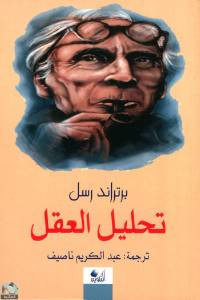📘 ❞ An Outline of Philosophy (Routledge Classics) by Bertrand Russell ❝ كتاب ــ برتراند راسل اصدار 1708
الفكر والفلسفة - 📖 كتاب ❞ An Outline of Philosophy (Routledge Classics) by Bertrand Russell ❝ ــ برتراند راسل 📖
█ _ برتراند راسل 1708 حصريا كتاب ❞ An Outline of Philosophy (Routledge Classics) by Bertrand Russell ❝ عن جميع الحقوق محفوظة للمؤلف 2025 Russell: THE FAMED PHILOSOPHER PROVIDES A “SCIENTIFIC” BASIS FOR PHILOSOPHY Bertrand Arthur William (1872 1970) was an influential British philosopher, logician, mathematician, and political activist In 1950, he awarded the Nobel Prize in Literature, recognition his many books [NOTE: page numbers below refer to a 317 paperback edition ] He begins this book (first edition, 1920) saying, “The definition ‘philosophy’ will vary… all that we can say begin with is there are certain problems… which do not… belong any special sciences These problems such as raise doubts concerning what commonly passes for knowledge… arises from unusually obstinate attempt arrive at real knowledge What ordinary life suffers three defects: it cocksure, vague, self contradictory The first step towards philosophy consists becoming aware these defects… order substitute amended kind shall be tentative, precise, consistent ” (Pg 1 2) He observes, “This something difficulty Watsonian theory language… I may one person, ‘I met Mr Jones train today,’ another ‘Joseph 9:35 morning ’ With exception words ‘in the’, two sentences have nothing verbally common, yet they relate same fact, use either indifferently when recall fact Thus my recollection certainly NOT definite verbal habit… If behaviorist … telling me VERBAL habit, driven instances admission must some other habit says this, abandoning region observable taking refuge hypothetical bodily movements invoked save But hardly better than ‘thoughts ’” 77) He notes, notion ‘place’ also quite vague Is London ‘place’? earth rotating going around sun moving relatively stars At best you could talk place given time; but then ambiguous time, unless confine yourself So evaporates 115) He points out, “We not, ‘observe’ here said observe; INFERRED observe, astronomy, dimensional pattern light, few bright surfaces measurable size seen through telescope (the planets)… OBSERVED facts There no logical impossibility about medieval doctrine spheres round earth, each planet modern doctrines simpler, not whit more accordance observed facts; our passion SIMPLE laws has made us adopt them 126) الفكر والفلسفة مجاناً PDF اونلاين ترتيب أمور معلومة للتأدي إلى مجهول ويُستخدم الدراسات المتعلقة بالعقل البشري ويشير قدرة العقل تصحيح الاستنتاجات بشأن ما هو حقيقي أو واقعي وبشأن كيفية حل المشكلات ويمكن تقسيم النقاش المتعلق بالفكر مجالين واسعي النطاق وفي هذين المجالين استمر استخدام المصطلحين "الفكر" و"الذكاء" كمصطلحين مرتبطين ببعضهما البعض الفلسفة (لغويا من اليونانية φιλοσοφία philosophia والتي تعني حرفيًا "حب الحكمة") هي دراسة الأسئلة العامة والأساسية الوجود والمعرفة والقيم والعقل والاستدلال واللغة غالبًا تطرح مثل هذه كمسائل لدراستها حلها ربما صاغ مصطلح "فيلسوف (محب الحكمة)" الفيلسوف وعالم الرياضيات فيثاغورس (570 495 قبل الميلاد) تشمل الأساليب الفلسفية الاستجواب والمناقشة النقدية والحجة المنطقية والعرض المنهجي وهذا ركن خاص بكتب مجانيه للتحميل
- مساهمة من: محمد عبيد
( الأحد 5 يناير 2025 ( 5:24 مساءً )) - تبليغ عن سوء استخدام

THE FAMED PHILOSOPHER PROVIDES A “SCIENTIFIC” BASIS FOR PHILOSOPHY
Bertrand Arthur William Russell (1872-1970) was an influential British philosopher, logician, mathematician, and political activist. In 1950, he was awarded the Nobel Prize in Literature, in recognition of his many books. [NOTE: page numbers below refer to a 317-page paperback edition.]
He begins this book (first edition, 1920) by saying, “The definition of ‘philosophy’ will vary… all that we can say to begin with is that there are certain problems… which do not… belong to any of the special sciences. These problems are all such as to raise doubts concerning what commonly passes for knowledge… Philosophy arises from an unusually obstinate attempt to arrive at real knowledge. What passes for knowledge in ordinary life suffers from three defects: it is cocksure, vague, and self-contradictory. The first step towards philosophy consists in becoming aware of these defects… in order to substitute an amended kind of knowledge which shall be tentative, precise, and self-consistent.” (Pg. 1-2)
He observes, “This is something of a difficulty in the Watsonian theory of language… I may say to one person, ‘I met Mr. Jones in the train today,’ and to another ‘Joseph was in the 9:35 this morning.’ With the exception of the words ‘in the’, these two sentences have nothing verbally in common, yet they may relate the same fact, and I may use either indifferently when I recall the fact. Thus my recollection is certainly NOT a definite verbal habit… If the behaviorist … begins by telling me that it is a VERBAL habit, he can be driven by such instances to the admission that it must be some other kind of habit. If he says this, he is abandoning the region of observable fact, and taking refuge in hypothetical bodily movements invoked to save a theory. But these are hardly better than ‘thoughts.’” (Pg. 77)
He notes, “The notion of a ‘place’ is also quite vague. Is London a ‘place’? But the earth is rotating. Is the earth a ‘place’? But it is going around the sun. Is the sun a ‘place’? But it is moving relatively to the stars. At best you could talk of a place at a given time; but then it is ambiguous what is a given time, unless you confine yourself to one place. So the notion of ‘place’ evaporates.” (Pg. 115)
He points out, “We do not, in fact, ‘observe’ what it is here said that we observe; all this is INFERRED. What we observe, in astronomy, is a two-dimensional pattern of points of light, with a few bright surfaces of measurable size when seen through the telescope (the planets)… These are the OBSERVED facts. There is no logical impossibility about the medieval doctrine of spheres rotating round the earth, one for each planet and one for the stars. The modern doctrines are simpler, but not one whit more in accordance with the observed facts; it is our passion for SIMPLE laws that has made us adopt them.” (Pg. 126)
#5K
0 مشاهدة هذا اليوم#83K
3 مشاهدة هذا الشهر#129K
35 إجمالي المشاهدات- 🎁 كن أول كاتب اقتباس في هذه الصفحة واحصل على هديّة 15 من النقاط فوراً 🎁
-
كتب أخرى لـ برتراند راسل:
- ❞ إنهم يجعلون علم النفس يعتمد بشكل متزايد على علم الهيئة والمشاهدة الخارجية، ويميلون للتفكير بالمادة كشيء ما أكثر تماسكاً بكثير وأقل عرضة للشك من العقل، بينما الفيزيائيون، ولا سيما أينشتاين والأنصار الآخرون لنظرية النسبية، يجعلون ((المادة)) أقل وأقل مادية. عالمهم يتكون من وقائع تستمد منها المادة من خلال تركيب منطقي. فكل من يقرأ، مثلاً، كتاب الأستاذ إدينغتون ((المكان، الزمان والجاذبية)) سيرى أن المادة عتيقة – الطراز لم تعد تلقى دعماً من الفيزياء الحديثة. وأظن أن ما يتصف بقيمة ثابتة في نظر السلوكيين إنما هو الشعور بأن الفيزياء هي العلم الأكثر أساسية في الوجود الراهن. لكن هذا الموقف لا يمكن أن يدعى مادياً، إذ لم تعتبر الفيزياء، كما يبدو أنها هي الحالة، وجود المادة أمراً مفروغاً منه.. ❝ ⏤برتراند راسل❞ إنهم يجعلون علم النفس يعتمد بشكل متزايد على علم الهيئة والمشاهدة الخارجية، ويميلون للتفكير بالمادة كشيء ما أكثر تماسكاً بكثير وأقل عرضة للشك من العقل، بينما الفيزيائيون، ولا سيما أينشتاين والأنصار الآخرون لنظرية النسبية، يجعلون ((المادة)) أقل وأقل مادية. عالمهم يتكون من وقائع تستمد منها المادة من خلال تركيب منطقي. فكل من يقرأ، مثلاً، كتاب الأستاذ إدينغتون ((المكان، الزمان والجاذبية)) سيرى أن المادة عتيقة – الطراز لم تعد تلقى دعماً من الفيزياء الحديثة. وأظن أن ما يتصف بقيمة ثابتة في نظر السلوكيين إنما هو الشعور بأن الفيزياء هي العلم الأكثر أساسية في الوجود الراهن. لكن هذا الموقف لا يمكن أن يدعى مادياً، إذ لم تعتبر الفيزياء، كما يبدو أنها هي الحالة، وجود المادة أمراً مفروغاً منه. ❝
⏤ برتراند راسل





